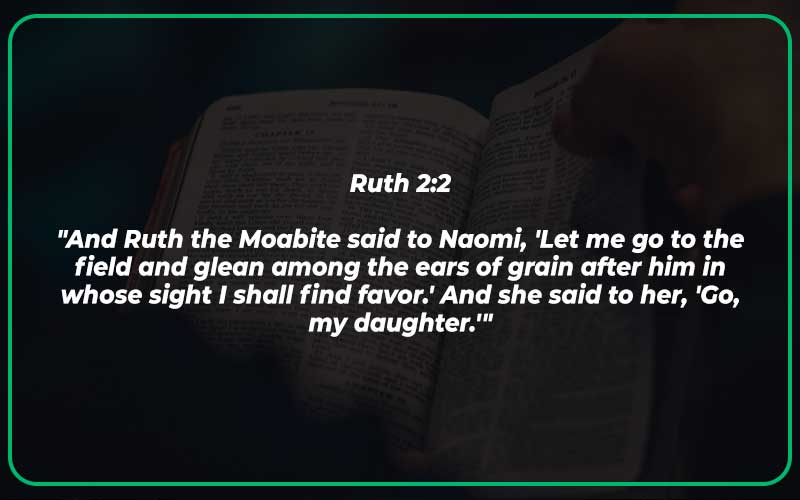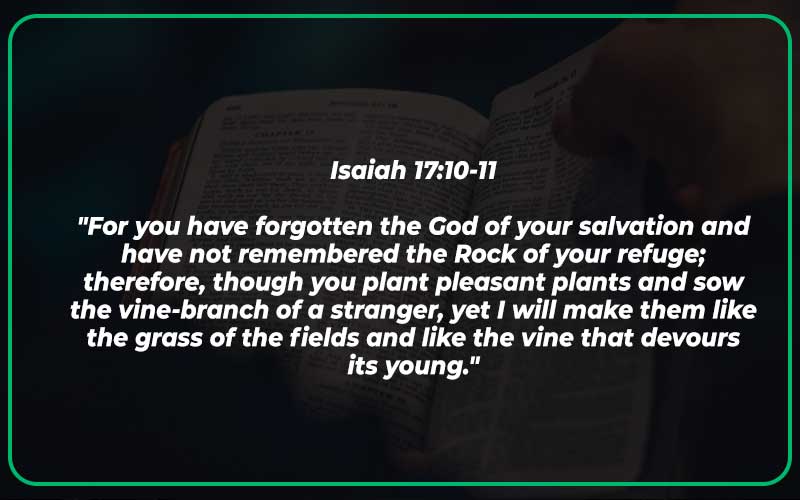As the seasons change and nature’s bounty unfolds, the concept of harvest takes center stage. Harvest not only represents the gathering of crops but also carries deeper spiritual significance. In this blog post, we’ll embark on a journey through the Bible to explore verses about harvest.
Through the metaphors and imagery used in these scriptures, we’ll discover profound lessons about reaping what we sow, gratitude, and the abundant blessings that can be found in our lives. So grab your virtual basket and join me as we delve into the rich harvest of biblical wisdom.
Also Read: Bible Verses About Caring For Others
Bible Verses About Harvest
Leviticus 23:39
“On the fifteenth day of the seventh month, when you have gathered in the produce of the land, you shall celebrate the feast of the Lord seven days.”
This verse highlights the importance of celebrating the harvest season and giving thanks to the Lord for the abundance of blessings. It emphasizes the need to acknowledge God’s provision for all creatures and to express gratitude for His grace and favor.
Galatians 6:9
“And let us not grow weary of doing good, for in due season we will reap, if we do not give up.”
This verse encourages believers to persevere in doing good and to trust that the Lord will bless their labor in due season. It emphasizes the need to remain steadfast in faith and to trust in God’s timing and plan for our lives.
Psalm 126:6
“He who goes out weeping, bearing the seed for sowing, shall come home with shouts of joy, bringing his sheaves with him.”
This verse reminds us that the harvest season can involve hard work and sacrifice, but it also brings great joy and reward. It emphasizes the need to sow generously and trust in God’s provision, even in times of difficulty and tears.
Proverbs 20:4
“The sluggard does not plow in the autumn; he will seek at harvest and have nothing.”
This verse warns against laziness and procrastination, highlighting the importance of being diligent and proactive in preparing for the harvest season. It emphasizes the need to plan ahead and work hard to ensure a bountiful harvest, both physically and spiritually.
Joel 3:13
“Put in the sickle, for the harvest is ripe. Go in, tread, for the winepress is full. The vats overflow, for their evil is great.”
This verse describes the urgency of the harvest season, urging believers to be ready to reap the fruits of their labor and to respond to God’s call. It emphasizes the need to recognize the signs of the times and to be prepared for spiritual warfare and battle.
Proverbs 3:9-10
“Honor the Lord with your wealth and with the firstfruits of all your produce; then your barns will be filled with plenty, and your vats will be bursting with wine.”
This verse encourages believers to offer the first and best of their harvest to the Lord as an act of worship and gratitude. It emphasizes the need to acknowledge God’s ownership and sovereignty over all things, including our material possessions and resources.
Matthew 9:37-38
“Then he said to his disciples, ‘The harvest is plentiful, but the laborers are few; therefore pray earnestly to the Lord of the harvest to send out laborers into his harvest.'”
This verse reminds us of the importance of evangelism and outreach, emphasizing the need to pray for more workers to join in the harvest of souls. It emphasizes the urgency of the mission and the need to be ready and willing to share the love of Christ with those who are lost and in need of salvation.
Isaiah 9:3
“You have multiplied the nation; you have increased its joy; they rejoice before you as with joy at the harvest, as they are glad when they divide the spoil.”
This verse celebrates the blessings and benefits of a bountiful harvest, both physical and spiritual. It emphasizes the joy and gratitude that come with receiving God’s abundant provision and grace, and it encourages believers to share their bounty and blessings with others.
Jeremiah 5:24
“They do not say in their hearts, ‘Let us fear the Lord our God, who gives the rain in its season, the autumn rain and the spring rain, and keeps for us the weeks appointed for the harvest.'”
This verse highlights the importance of recognizing and revering God’s sovereignty and power over the natural world, including the rain and the harvest seasons. It emphasizes the need to have a right and respectful attitude towards the Creator and to acknowledge His goodness and generosity towards us.
Ruth 2:2
“And Ruth the Moabite said to Naomi, ‘Let me go to the field and glean among the ears of grain after him in whose sight I shall find favor.’ And she said to her, ‘Go, my daughter.'”
This verse tells the story of Ruth, a faithful and humble woman who goes out to glean in the fields and gathers the leftover grain for herself and her mother-in-law. It emphasizes the importance of hard work, diligence, and kindness in the harvest season, and it underscores the need to trust in God’s provision and plan even in times of hardship and uncertainty.

Isaiah 17:5
“For you have forgotten the God of your salvation and have not remembered the Rock of your refuge; therefore, though you plant pleasant plants and sow the vine-branch of a stranger,”
This verse warns against the danger of forgetting or neglecting God in the midst of the harvest season, highlighting the risk of relying on human effort or external resources without acknowledging God’s power and grace. It emphasizes the need to stay connected to the Lord and to seek His wisdom and guidance in all things.
Matthew 13:24-30
“He put another parable before them, saying, ‘The kingdom of heaven may be compared to a man who sowed good seed in his field, but while his men were sleeping, his enemy came and sowed weeds among the wheat and went away. So when the plants came up and bore grain, then the weeds appeared also. And the servants of the master of the house came and said to him, ‘Master, did you not sow good seed in your field? How then does it have weeds?’ He said to them, ‘An enemy has done this.’ So the servants said to him, ‘Then do you want us to go and gather them?’ But he said, ‘No, lest in gathering the weeds you root up the wheat along with them. Let both grow together until the harvest, and at harvest time I will tell the reapers, ‘Gather the weeds first and bind them in bundles to be burned, but gather the wheat into my barn.'”‘ “
This verse tells the parable of the wheat and the tares, highlighting the need to discern and distinguish between good fruit and bad fruit in the harvest season. It emphasizes the importance of patience, wisdom, and discernment in identifying and separating the true followers of Christ from those who are false or insincere.
Philippians 4:17
“Not that I seek the gift, but I seek the fruit that increases to your credit.”
This verse underscores the importance of bearing good fruit in the harvest season, highlighting the need to invest in the lives of others and to share the love of Christ generously. It emphasizes the eternal value of investing in God’s kingdom and the joy and reward that come with seeing others come to faith and grow in their relationship with Christ.
Deuteronomy 16:13-15
“You shall keep the Feast of Booths seven days, when you have gathered in the produce from your threshing floor and your winepress. You shall rejoice in your feast, you and your son and your daughter, your male servant and your female servant, the Levite, the sojourner, the fatherless, and the widow who are within your towns. For seven days you shall keep the feast to the Lord your God at the place that the Lord will choose, because the Lord your God will bless you in all your produce and in all the work of your hands, so that you will be altogether joyful.”
This verse highlights the celebration of the Feast of Booths, which commemorates the harvest season and reminds the people of Israel of God’s faithfulness and provision. It emphasizes the need to include everyone in the celebration, including the less fortunate and the marginalized, and to express gratitude and joy for God’s blessings in all areas of life.
Isaiah 17:10-11
“For you have forgotten the God of your salvation and have not remembered the Rock of your refuge; therefore, though you plant pleasant plants and sow the vine-branch of a stranger, yet I will make them like the grass of the fields and like the vine that devours its young.”
This verse warns against the consequences of forgetting or disobeying God’s commands and laws in the harvest season, highlighting the risk of experiencing judgment and punishment for our sins and disobedience. It emphasizes the need to stay faithful and obedient to God’s will and to seek His forgiveness and grace when we fall short.

Understanding the Significance of Harvest in the Bible
Harvest holds great significance throughout the Bible, both in the literal sense of agricultural yield and as a metaphor for spiritual truths. In biblical times, agriculture was a central part of the economy and culture, and thus, harvest was a crucial event in the lives of the people. Beyond the literal meaning, various passages in the Bible use the concept of harvest to convey deeper spiritual and moral lessons.
Harvest as a Metaphor for Spiritual Abundance
In the New Testament, Jesus often used agricultural imagery to teach spiritual lessons. He referred to Himself as the “true vine” and His followers as branches, illustrating the necessity of staying connected to Him to bear spiritual fruit (John 15:1-8). The idea of bearing fruit is related to the concept of harvest, where a bountiful crop represents spiritual abundance resulting from a life lived in accordance with God’s principles.
The Harvest as a Symbol of God’s Provision
Throughout the Old Testament, we find instances where God’s provision is likened to a bountiful harvest. Psalm 65:11, as mentioned earlier, highlights how God crowns the year with bounty, emphasizing that all blessings and abundance come from Him. This portrayal of God as the ultimate provider aligns with biblical teachings on gratitude, contentment, and the acknowledgment of God’s sovereignty over creation.
The Spiritual Harvest and Evangelism
The verse in Luke 10:2 presents the metaphor of the abundant spiritual harvest waiting to be reaped. Here, “harvest” symbolizes the souls ready to receive the gospel and enter into a relationship with God. The “laborers” refer to the believers called to share the message of salvation, underscoring the importance of evangelism and the spreading of the good news.
Perseverance and Joy in Spiritual Harvest
Psalm 126:5-6 reflects the emotional journey of sowing and reaping, comparing tears shed during sowing to the joy experienced when the harvest is gathered. This metaphor teaches a profound lesson about perseverance in difficult times. The process of sowing seeds and waiting for the harvest is a reminder that growth and blessings often require patience and trust in God’s timing.
The Final Harvest and God’s Judgment
The verse from Revelation 14:15 introduces the imagery of the final harvest, where the earth is fully ripe for reaping. This verse points to the culmination of God’s plan for redemption and judgment at the end of time. The ripeness of the harvest symbolizes the completion of God’s work, emphasizing the importance of spiritual readiness and preparation for the final reckoning.

